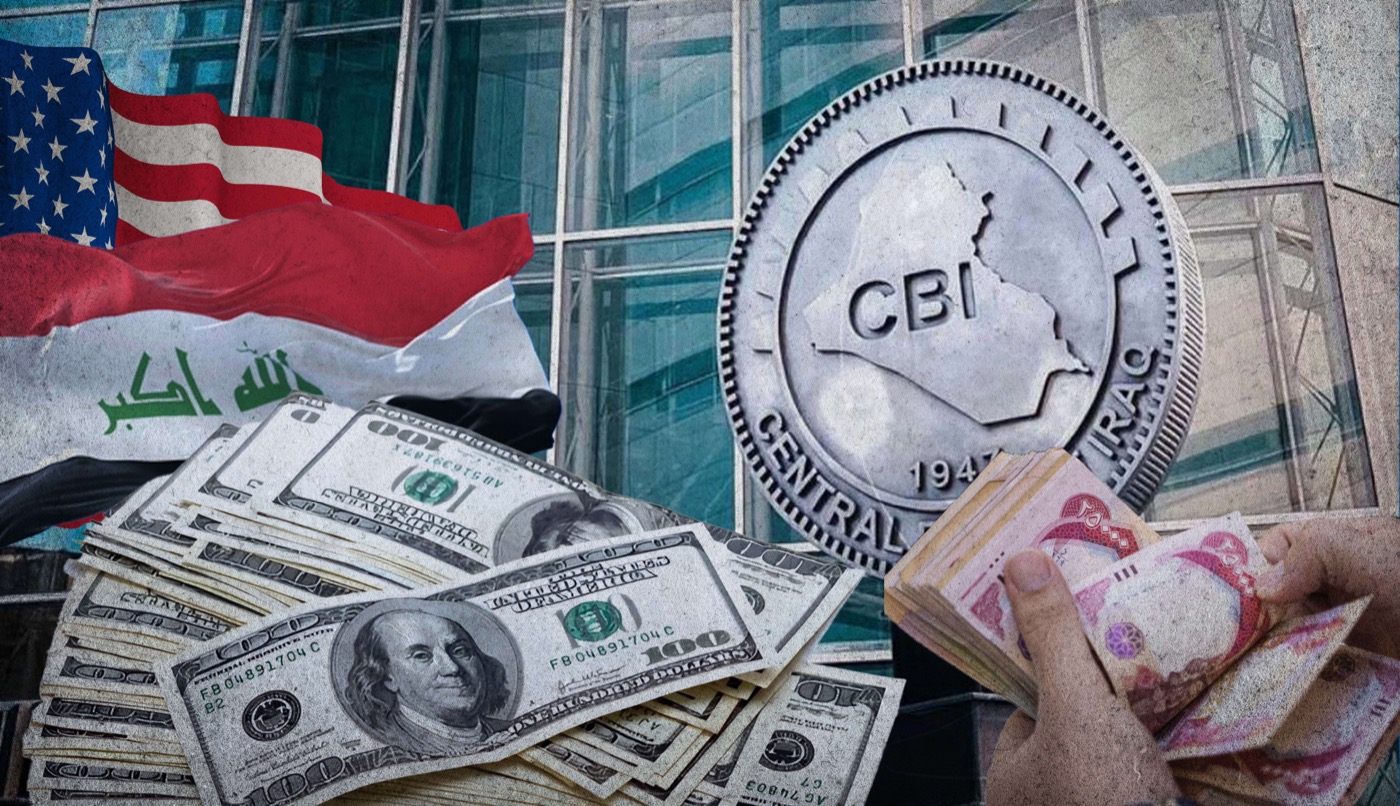BAGHDAD, Iraq - “I work hard every month. However, in the end my bank refuses to give my salary or to negotiate the rate for receiving it in the local currency, which means losing more than 500,000 dinars of its value,” Dima Al-Bakr, 30, told The New Region.
Several hundred dollars, that is: at either the official rate or the very different parallel market one.
Bakr works at a media coordination company. As part of the terms of her contract, she is supposed to receive her salary in USD and says she has been reduced to a near-constant state of anxiety in recent months due “dollar restrictions” imposed across Iraq.
“Is my salary from them?” she asked sarcastically, referring to the bank and its employees.
Bakr added that getting her salary from abroad had become almost impossible and that she now does not receive the full amount even after waiting for two or three months.
It is after her salary arrives that her exasperating struggle with the bank begins, she said.
Banks claim full amount is ‘not available, come back tomorrow’
Iraqi banks have recently begun refusing to give depositors their money in dollars in order to “control exchange rates”, they say, in line with an announcement by the Central Bank of Iraq (CBI) that it would no longer allow withdrawal or deposits in USD starting in 2024.
This has raised concern among Iraqis, especially among those accustomed to receiving their salaries from abroad.
Bakr told The New Region that bank employees continually tell her to come back the next day, sometimes saying that the full amount of her salary is not available.
“We may be able to give you half your salary as a maximum and in the local currency,” they tell her, she said.
Bakr stressed that this leaves her in a constant state of anxiety every month as she relies solely on this salary to provide for all her needs.
“I can’t forget one time I went [to the bank] and was trying very hard to stay calm,” since she needed the full amount of her salary badly, Bakr said.
“I was hoping to get all my money but they refused as usual and told me to speak to the manager. The manager agreed to give me a very small amount,” she said. “Then, it all ended with the cashier slamming her desk angrily as if she was the one giving me her money –not my money. And that was my salary, which had already arrived at the bank a month before.”
Humiliation, Bakr said, is what so many Iraqi citizens like herself are feeling.
What exactly is happening?
The director of one private bank, who spoke on condition of anonymity due to personal safety concerns, tried to shed a bit of light on the complex process taking place now in Iraq in which many foreign transfers are salaries for employees of foreign companies or those involved in trade.
He noted in speaking to The New Region that receiving these salaries in dollars has in most cases become prohibited or at the very least exceedingly complicated.
Companies are required to provide statements and secret numbers, he said, and then transfer them from an intermediary bank to the US Federal Reserve and then again to the CBI, which then decides to allow withdrawal of deposits only in accordance with liquidity.
“Some citizens still do not know the reasons for the banks’ refusal to give them the full amounts,” he said.
However, he stressed, “this does not depend on us.”
The CBI tries to ensure adequate liquidity and avoid market volatility, he added, and “if we give customers and depositors their full amount, this will reduce the banks’ availability of cash and create confusion”.
Speaking to The New Region, the private bank director said that the situation had become complicated after the Federal Reserve had decided to reduce its supply of dollars to the Central Bank by up to 50% due to the failure of some Iraqi banks to comply with regulations related to money smuggling and laundering.
“This is what makes banks today unable to give large amounts of dollars,” he claimed, saying that before it had been possible for banks to sell “over 700 million USD per day, but at the present time the maximum amount of this currency sold is 250 million USD.”
The bank director added that many customers who have bank accounts abroad such as in Dubai or Amman had begun depositing their money in those accounts instead.
This, he opined, will result in massive losses for Iraq since other countries are not only not restricting the entry of hard currency, they are “rejoicing at the entry of it”.
Money laundering surge led to US crackdown
Economic researcher Ahmed Jawad pointed out to The New Region that Iraq had been suffering from money laundering for many years but that the effects of the crime had surged recently, leading to the US Treasury and the Federal Reserve Bank of New York imposing a ban on 14 Iraqi banks from conducting transactions in USD in July.
The ban has in turn affected USD exchange rates.
Jawad added that one of the methods of fraud used was to issue credit cards in large quantities. Payments for these cards were made in dollars.
Travelers have been arrested time and again carrying a large number of these cards issued by certain banks and it is possible that some of those dealing with these banks are searching for dollars on the parallel market, whether to finance their businesses or to smuggle them abroad, he said.
The researcher added: “Everything that is happening is illegal, even limiting trade to Iraqi dinars only is against the Iraqi constitution, because Iraq’s economy became international after 2003. It is expected that the local currency will lose a lot of its value with the new procedures. However, this system was put in place in agreement with the Federal Reserve, where Iraq holds $120 billion in oil sales.”
Iraqis already hesitant to deposit in banks to become more so
Jawad said Iraqi citizens and employees will suffer the effects of the loss of a difference in the USD exchange rates when it becomes obligatory to convert it into the local currency at the official CBI exchange rate of 1,320 dinars per dollar, much lower than the fluctuating unofficial one on the parallel market.
Iraqis receiving their salaries in dollars would until recently typically take their USD received from banks to money exchanges scattered throughout the country where a dollar would garner at least 1,580 IQD as of early November.
“No one will compensate the groups affected” by the new regulations, Jawad said, adding that the “high cost of living depends on the price of the dollar in the parallel market.”
The CBI “sacrificed the easiest group”, he claimed, adding that “other solutions were possible.”
Unregulated transfers have become very expensive, in any case, he added. Transferring 10,000 USD to Amman or Dubai now costs over 500 USD, whereas - before the implementation of an electronic platform – this used to cost 40 USD at the most.
“We can say that 80% of Iraqi citizens do not deposit their money in banks due to the fluctuation of the rate,” he said, and “after what happened recently, even the Iraqi currency deposit rate in banks will decrease and citizens will be more careful about their money.”
‘Stolen from through legal, official ways’
The photographer Ali Ahmed, 36, told The New Region that his bank refuses to give him the money he receives for his work even though the CBI had announced that this measure would be implemented in early 2024.
"When I enter the bank with a paper proving my right to withdraw money for these two months in dollars, the bank employees mock me and say that the CBI is making a fool of you,” he said. “We are being stolen from through legal, official ways.”
“My salary is $2,000, which means that I lose the equivalent of 500,000 Iraqi dinars,” he noted, angrily. “Will the CBI governor compensate me for these losses, or are we citizens the only ones responsible for balancing the country’s currency?”



 Facebook
Facebook
 LinkedIn
LinkedIn
 Telegram
Telegram
 X
X


